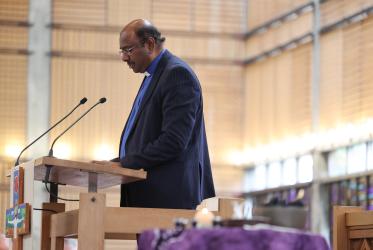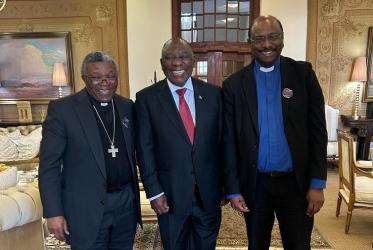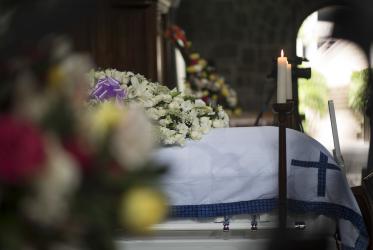Memorial ceremony for Nelson Mandela (1918-2013)
Chapel of the Ecumenical Centre, Geneva
Address by the moderator of the WCC Central Committee, Dr Agnes Aboum
We are here to commemorate the life of a man whose walk to freedom impacted our fellowship deeply
There is no greater love than to give up one’s freedom for the sake of the freedom of others
In the midst of the joy and the unfolding promise of new found freedom and the generosity of a life well lived there is always a sad tale when death puts an end to a wonderful life of such as that of Nelson Mandela. Many seek fame and riches because it has become fashionable but for Mandela this was never the case. Apartheid was a deceitful system of domination that normalized oppression and brutality on the basis of a false anthropology that reduced Africans as an underclass that were racially inferior to the rest of humanity. Mandela led a simple life. And may I rephrase the words of Jesus; there is no greater love than to give up ones freedom for the sake of the freedom of others. Mandela took with him the suffering of the people who were alienated from their land and even from their own sacred history and identity; he spent 27 years contemplating in prison the alternative world for his people. He can only be compared with the biblical Joseph who rose up from Jail and became a leader who in turn forgave those who had sold him into slavery. He took the burden of a fractured society and with humility transcended the forces of fragmentation that threatened to tear the Nation apart. He was called to facilitate healing to a country deeply divided by the ideology of racism and the infrastructure of terror. He was inspired by a vision of a new rainbow society in which the black majority would not be vengeful towards the white minority and that there would be peaceful co-existence rooted on truth, forgiveness and reconciliation. The role of the ecumenical movement in the anti-apartheid struggle is self-evident. Churches were bombed and liberation theologians and progressive Church leaders trailed and kept under surveillance by the apartheid regime. By naming of the ethos of apartheid as a sin against God and humanity, the kairos theological movement in South Africa confronted the ideology of apartheid as essentially morally evil.
Nelson Mandela affirmed this theological thinking during his profound message to the World Council of Churches 8th Assembly held at Harare, Zimbabwe in 1998.
The corrupted souls seek nothing but their own glory. Self glorification leads to corruption. Mandela has remained for us a model of incorruptibility and selflessness.
Unless we learn from the model of humility of the leadership left to us by Mandela, the world will remain a jungle where the strong feed on the weak and the powerful run over the powerless. Even at this late hour at the departure of Madiba, the world is still driven by a system of greed and leadership that is money-hungry, intolerant and selfish to its own people. Most of these leaders have immortalized themselves through monuments and are ready to do anything just to attain their egotistical goals. Some leaders would drive their own people to ethnic animosity in order to stay in power. The idea of freedom from colonialism was not to have a fox roaming freely in a chicken-stall. No, the fox must be tamed. With the departure of Mandela most of the foxes in the continent have been tamed and a new era of third liberation has dawned upon Africa and Mandela remains the model and the epitome of this third liberation.
Nelson Mandela gave a moving account of the contribution of the ecumenical movement to the struggle for freedom in southern Africa during the 50th anniversary of the WCC. He was described by our own Archbishop Desmond Tutu during the assembly as a man “who emerged from prison not spewing words of hatred and revenge. He amazed us all by his heroic embodiment of reconciliation and forgiveness. No one could have accused him of speaking glibly and facilely about forgiveness and reconciliation. He had been harassed for a long time before his arrest, making impossible a normal family life. No one could say that he knew nothing about suffering. A famous picture shows Nelson Mandela on Robben Island with Walter Sisulu in the court yard of the jail where they and others – who can be seen behind them in the photograph sitting and breaking rocks into small pieces.”
And then came the innovative idea of the Truth and Reconciliation Commission. TRC in South Africa was both a painful but also a healing process which brought the whole nation to face its wounded past and realize that there would be “future with forgiveness”. The TRC report was submitted in December 1998 and is an embodiment of the ecumenical contribution of the Churches together, for without spirituality it is impossible to be reconciled with a history of over 300 years and a heavy burden of brutal crimes and violence against humanity. Mandela relinquished power voluntarily after his first term and this has remained an incredible example of contentment.
As our own Mercy Oduyoye once said “Beloved ancestors, you gave up your people for labor, then you gave up the land to be colonized.’’ We can and must think and work for change. We’ve done it in South Africa where we rescued our humanness from the jaws of racism. How will South Africa use this newborn dignity in Africa and globally? But may I add “Beloved ancestors, we thank you for Mandela, the land has been restored back to your people and now there are no whites or black no go zones, and now that Mandela is gone please let new Mandela's be re-born in the continent for the sake of the third liberation’’. Mandela believed that people are people through other people hence in his one term presidency he governed by consensus for the sake of “peace, democracy and justice for all”.
Let us not forget that Mandela was a gift from Africa to the whole world. How wonderful it was to see more than half of the leadership of the globe being brought together by the calling of this Man; indeed with the presence of God he has become the moral embodiment and rebirth of a new global consciousness for unity of humankind. We thank God for giving Mandela to us the time He did and may his values continue to inspire our vision and fellowship.



